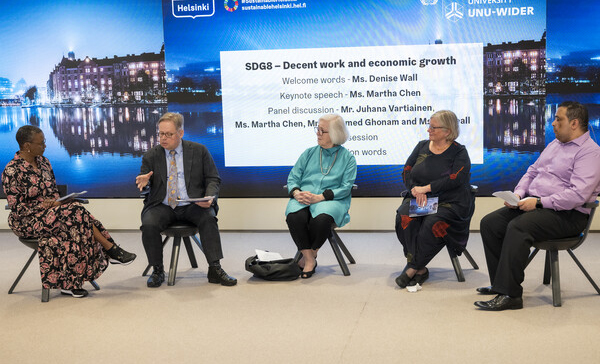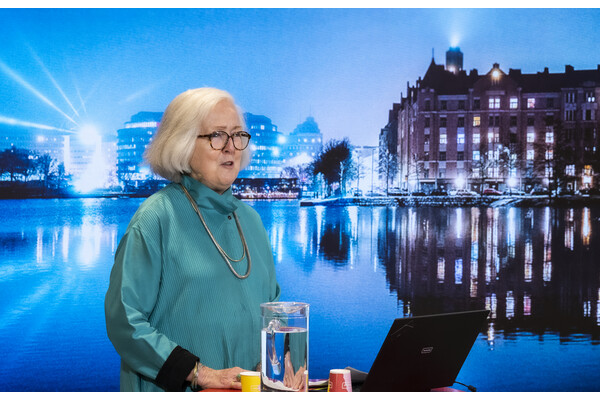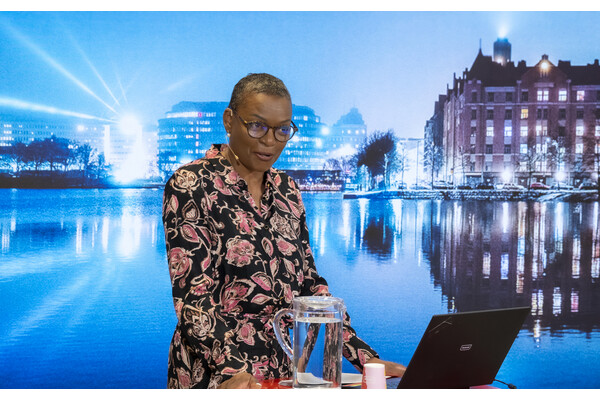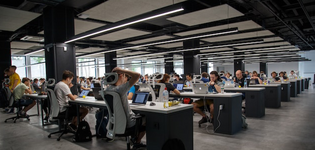Blog
Decent work – discussion on working conditions in Helsinki and globally
How committed is Helsinki to achieving the UN Sustainable Development Goals? The discussion forum at the City Hall on Tuesday addressed one of the goals, namely decent work and economic growth.

Nearly 200 countries agreed on 17 UN Sustainable Development Goals (SDGs) seven years ago. Helsinki was the first city in Europe and second in the world to sign its voluntary commitment to the goals.
Organised jointly by the City and the United Nations University World Institute for Development Economics Research (UNU-WIDER), the event discussed working conditions in Helsinki and around the world.
Journalists find issues also in Finland

The theme and informal work, in particular, were discussed at the event and in a related panel discussion by Harvard Kennedy School’s Assistant Professor Martha Chen, Kalliolan Setlementti’s Community Coordinator Mohamed Ghonam, London School of Economics’ Emeritus Professor Jo Beall and Mayor Juhana Vartiainen.
The working conditions of Finns fare well in international comparison. Here, labour legislation and the Occupational Safety and Health Act require employers to look after their employees’ health and safety at work.
However, Vartiainen points out that there is some information and signals about another kind of reality, including working in poor conditions without appropriate contracts and tax deductions. “It might not be a great many people, but there are examples of exploitation. We don’t know enough about it, but some journalists, for example, have done great work in reporting such cases.”
According to Vartiainen, the most vulnerable group in the labour market is undocumented people, meaning individuals with no legal status in Finland. "Fearing repatriation, they may be forced to work even in slave-like conditions in restaurant kitchens, for example. The phenomenon is not very widespread, but it exists."
Then there are self-employed who work long hours, even though young people, in particular, might want to study instead.
Professor Chen from Harvard Kennedy School reminded the participants of global statistics showing that 45% of all workers are self-employed. “We have to change the mindset. We have to change the labour models to incorporate large self-employment. And we have to realise that a lot of sector policies are affecting the self-employed,” Chen says.
The position of employees in the platform economy has also become a topic of discussion. Questions have been raised as to whether, for example, the rights and working practices of food couriers are fair.
Integration plays a major role
Cities should have tools in place to address the shortcomings in working conditions. “A city has a toolbox to work on these issues. Then, we must have a realistic assessment of what that toolbox is. Still, much of the tools lie in the hands of the national legislator. But still, we as cities and decision-makers shouldn’t just wave our hands and say we cannot do anything,” Vartiainen says.
Helsinki has already started the work. The city’s employment services provide comprehensive information about Finnish working life, including employee rights. The city has also drawn up guidelines to prevent labour exploitation.
The successful integration of immigrants also contributes to fair working conditions. “Anybody who has been granted the right to be a resident of Helsinki, we offer our full set of welfare services, that is, health care and education.”
Professor Chen points out that access to public services would be highly desirable elsewhere as well. Urbanisation is progressing rapidly, and the role of cities as protectors of people’s rights is increasing. Helsinki also benefits from an active and extensive third sector with actors such as Kalliolan Setlementti that supports and helps people at different stages of their life.
Community Coordinator Ghonam from Kalliolan Setlementti has solid experience of the work already from his native Egypt, where he worked as a volunteer social worker helping people make a living. Some of his clients found livelihood from having their own cow, others from having a sewing machine.
Business through informal work

Professors Chen and Beall provided examples of informal work that has become, or is becoming, an increasingly important part of the market.
Indian street vendors have turned their city’s centre square into a marketplace for themselves, cooperating in planning the activities there. Local authorities first evicted them outside the city but finally approved their business.
In Colombia, 1,200 waste pickers in 32 cities receive a fixed payment for their work. The waste also includes recyclable material. Waste pickers may be considered at the lowest level of the workforce, but this is not always the case. Interviews conducted by researchers have revealed that some of them have set up their own businesses and are doing very well.
Child labour in developing countries is a difficult issue. There are parents who do not wish their children to have to work under any circumstance, but there are also those who want the children to come to their workplace to help them after school. This way, they stay off the streets and do not get involved with the street gangs.
Support also for entrepreneurs
Mayor Vartiainen is optimistic about the support provided by digitalisation. Starting a business, for example, should be made easier. Currently, entrepreneurs must navigate through a myriad of rules and regulations.
“In the city, we try to make it easier by offering counselling and digital service platforms for would-be entrepreneurs. Ideally, we would like to live in a world where you could start your own company in half an hour. We are not yet there, but we are working for that.”
Another way to improve the situation of migrants would be to guarantee them the right to work. Currently, the right to residence is based on having an employment contract and salary. “We want everybody to be legal and have pride in their working.”
Hosted by the Mayor, the event at the City Hall was organised by UNU-WIDER and the City of Helsinki in cooperation.
Tuesday’s event will not be the only one. The discussion forum series on the UN Sustainable Development Goals will continue in the autumn.
You can watch a recording of the event at Helsinkikanava.fi. The event is in English with English subtitles.
Kirsi Riipinen is contributing freelance journalist for the City of Helsinki.
The views expressed in this piece are those of the author(s), and do not necessarily reflect the views of the Institute or the United Nations University, nor the programme/project donors.
 Join the network
Join the network









